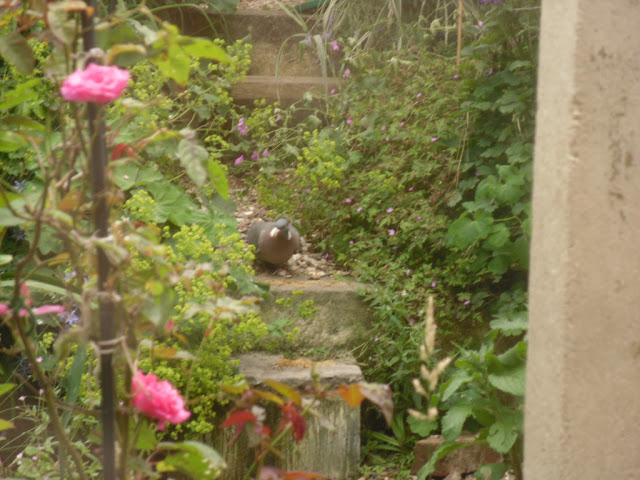In January this year, we dug a pond. You can see the lovely thing below.
The idea was to make our backyard more enticing to wildlife. A pond is the way to go, apparently, if you're interested in doing that.
We laboured over our hole in the ground for many a day. It was cold. It was muddy. It was unattractive.
Just to make it even more unattractive, we added a black plastic liner. I can't remember if this was the original which sprang a leak after a couple of weeks, or the later one which is still bravely holding water. We weighted the liner down with pots and bricks, to prevent it thrashing about in the frequent gales. In the picture above, it's frozen solid.
Here it is a little further along, still looking unlovely. We've covered some of the liner with earth, and added some plants at the further end. They came from my old pond in a pot (which also sprang a leak and will probably have a tree planted in it at some point.) The pond here is brimming full from the winter downpours. At the moment, it is brimming full from the summer downpours. A couple of weeks ago, the sunshine was so liquid, we had to bale the pond out for fear of flooding.
Here's one where you can actually see the water.
We were promised that if we did the work and made a pond, we would see more wild-life and the promise has been kept. I have seen more birds in the garden this year than in the past sixteen years I've lived here. Previously, they just flew over, even when I hung feeders out.
There is always a wood pigeon. Whatever kind of food is put out, Woodie is in there first. Here he is yearning after the niger seed which isn't intended for him. But we also have a little family of dunnocks, a wren, a robin, blackbirds, bluetits, great tits, starlings and house-sparrows.
A newcomer was spotted the other day: buff-coloured with marked white wing stripes and a darker head. It's suspected of being a chaffinch, but as yet, this is unconfirmed.
I've become very fond of the sparrows. They love the pond. They come down in a swirl, like falling leaves, and land around its edges, where they drink and bathe.
I'm very fond of this brute - 'Touch Me Not With Impunity' and it tells no lies. I was given this by my auntie, who had put on gauntlets and potted it up for me. It spent the winter lying flat in its pot. Then, one spring day, I noticed that all its spiky leaves had lifted themselves up and were pointing at the sky. So I put on armour and planted it against this wall. Since then, I swear it has grown an inch a week and, when the weather warmed up, a inch a day. It is now as tall as I am and you cannot get near it. In Flann O'Brien's The Third Policeman there is a lance with a point so sharp that its end is invisible and it stabs you while you think it is still inches away. Old Touch Me Not is like that. Its flower buds look soft and velvety but touch one and you leap back across the path with your spiked fingers in your mouth. - But we hope that the seeds will attract more birds.
This is the 'wood' at the top of my garden. There is a dogwood, a crab apple, some towering ferns and lots of brambles. And foxgloves.
The marsh-marigold in the pond. There is a large bud on one of the water-lilies but it's taking an age to open.
I end with Woodie, getting stuck into whatever it was that was scattered on the step. He's the only bird who hangs around long enough to be photographed.
The pond was worth the work. We've had more fun and interest out of it in these past months than almost anything else.


























.jpg)
.jpg)
.jpg)
.jpg)









